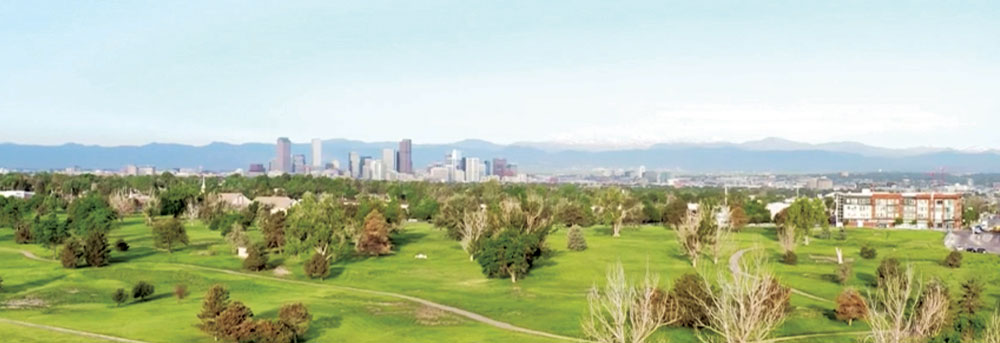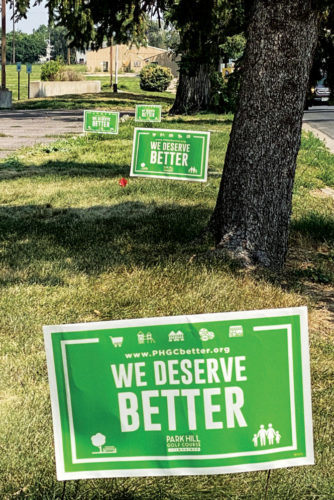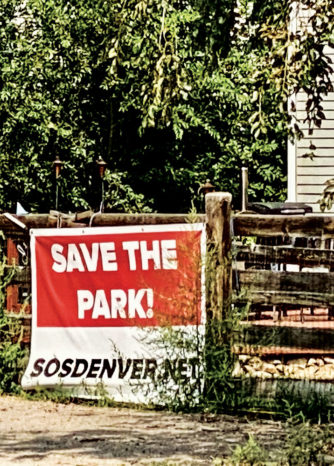
Numbers will be assigned to the ballot initiatives approximately September 3. The October issue of Front Porch will provide an explanation of all the City and State ballot issues with their numbers. Photo courtesy of Larry Walsh NW Drone Photography
This November, two similarly-worded ballot initiatives with opposite intentions will decide the fate of the Park Hill Golf Course, a currently unused 155-acre open space that sits at the corner of Colorado Blvd. and E. 35th Ave. Supporters of the Yes for Parks and Open Space initiative would like the entire golf course to become a park—and would prefer an unused golf course to allowing any development there. Supporters of the Empower NE Denver initiative favor a mixed-use property with retail, housing, and a minimum 60-acre developed park. Westside Investment Partners purchased the property for $24 million in 2019 and would be the developer if voters pass an initiative that allows development on the land—and City Council votes to support the development. (The Elections Division has not yet assigned numbers that will appear on the ballot—this article uses names chosen by the supporters of the initiatives.)
A Brief History
When wealthy real estate baron George W. Clayton died in 1899, his estate—which included the land that would become the Park Hill Golf Course—was transferred to a trust. For many years, the City of Denver operated the trust and at one time wanted to purchase the land outright. However, when the $2 million that was generated through a bond measure proved insufficient, the City settled for purchasing a conservation easement that “provides for the conservation of the golf course land as open space and for the continued existence…of a public golf course.” Westside and Save Open Space Denver (SOS) disagree on who can lift the easement. (Yes for Parks and Open Space is an arm of the SOS advocacy group.)
Westside and attorneys for the City of Denver believe that in order for any development to happen—mixed-use or otherwise—the conservation easement must be lifted. And—according to the easement—that can only be done by a vote of Denver City Council.
SOS argues that the conservation easement only requires that the property be used generally as open space, and therefore can be turned into a park without lifting the easement. They also argue that because of a state statute, a judge—not Denver City Council—is the only one who can lift the easement.
The outcome of these two ballot questions will determine whether voters citywide will decide on the future of the golf course land or whether Denver City Council decides.
What Will the Initiatives Do?
Yes for Parks and Open Space would change Denver’s municipal code so development on city-owned conservation easements could not happen without citywide voter approval. Park Hill Golf Course is the only City-owned land with a conservation easement.
EmpowerNEDenver.com would amend the definition of a conservation easement exempting the golf course from being considered easement property and therefore nullifying SOS’s measure even if it passes.
Potential Outcomes
If Yes for Parks and Open Space PASSES and Empower NE Denver FAILS, development could not happen without city-wide voter approval.
If Empower NE Denver PASSES and Yes for Parks and Open Space FAILS, development—if approved by Denver City Council—will be allowed on the property.
If BOTH PASS, development—if approved by Denver City Council—will be allowed on the property.
If BOTH FAIL, development—if approved by the Denver City Council—will be allowed on the property.

Empower Northeast Denver supporters believe that those who live closest to the Park Hill Golf Course should decide its future. Front Porch photos by Steve Larson
What Empower NE Denver Supporters Say
Empower NE Denver argues if the Yes for Parks and Open Space initiative passes, it will silence the voices of the Northeast Park Hill community and give the rest of Denver veto power over what happens in their neighborhood. In a March 2021 Front Porch article, District 8 Councilman Chris Herndon, who represents Park Hill said, “Yes, every individual gets a vote and that’s equal, but it’s not equitable to the people in NE Park Hill, a community that has been historically marginalized. The primary voice and the decision-making should come from those people that are in that community.”
Empower Denver supporters believe mixed use development with affordable housing and a park will enable displaced families to return and have job opportunities in their neighborhood where diverse demographics are declining rapidly. According to the census, Black citizens made up 89 percent of the NE Park Hill population in 1990 and only 36 percent in 2019.
According to Empower NE Denver’s website, Park Hill resident, Terrell Curtis, says, “This community has been disenfranchised for decades, and now people who do not live here are trying to allow the whole city to decide what’s best for us.” Imam Abdur-Rahim Ali, the resident Imam of the Northeast Denver Islamic Center says, “Our community has real needs and has been neglected for decades. What other neighborhood would even be asked to let other people decide what’s best for them?”
Councilwoman Cdebaca, in the fall of 2020, proposed that Denver City Council refer Yes for Parks and Open Space to the ballot. The vote was 10-3 to send the ballot measure back to committee due to all the questions and concerns Council members raised about it.
According to a survey mailed by the city, respondents from the community surrounding the Park Hill Golf Course have different priorities than those who live elsewhere in Denver. One survey was mailed to local residents who live within a mile of the golf course. The other was available online to anyone living in the City and County of Denver. Both contained the same questions. According to the survey, 85 percent of local residents want a grocery store. Many consider Park Hill a food desert and say Park Hill Supermarket isn’t sufficient for providing healthy, affordable food options.
Sixty-seven percent of local respondents want affordable housing, and 73 percent want a park with athletic fields. Empower NE Denver says that last statistic is proof that development can be the best of both worlds. Westside has already promised at least 60 acres of open space. As a comparison, Denver’s Central Park is 76.1 acres, Cheesman Park is 80.8 acres, and Del Mar Park is 39.9 acres.
Empower NE Denver supporters understand it’s easy to take an anti-developer stance, but point out that development doesn’t just benefit the rich. Norman Harris, Co-Founder of The Holleran Group, which is partnered with Westside, says, “There doesn’t have to be winners and losers. We can have a grocery store in the middle of this food desert, affordable housing to help with displacement, and a large park where our kids can play.”
And, they point out that all they’re displacing is a former golf course that used 106 million gallons of water, 3,200 pounds of fertilizer, and 1,600 pounds of pesticide in 2018, its final year of operation. The land continues to require resources but is not accessible for use by the public.

Supporters of SOS (Save Open Space) Denver and its committee Yes for Parks and Open Space believe all Denver voters should decide on the use of City of Denver-owned land with a conservation easement.
What SOS/Yes for Parks and Open Space Supporters Say
When Westside began planning possible future development, which has included a steering committee designated by the City, SOS filed a lawsuit arguing it was illegal to plan for development while the easement is still in place. Penfield Tate, an SOS member said, “There’s a state statute that says you cannot terminate, release, extinguish, or abandon a conservation easement without an order of a court, and the City hasn’t gone to court.” In the lawsuit, which is currently afoot, SOS argues that the conservation easement allows the property to be used as open space, and the only allowable development can be as a park without lifting the easement.
SOS and Yes for Parks and Open Space supporters describe themselves as a group of grassroots volunteers outgunned and outspent by a wealthy developer that can’t be trusted. According to their website, SOS wants to ensure that voters in the City and County of Denver have a voice in how land in designated parks and open spaces—specifically land protected by a conservation easement—is used. They say because taxpayers paid for the conservation easement, taxpayers should have a say in keeping that easement intact.
They argue the City is a “heat island” plagued with disproportionate amounts of pollution, and the 155-acres of open space provided by the Park Hill Golf Course could operate as a much-needed pair of lungs
SOS also argues the City is already in bed with Westside and that the steering committee—which includes Kenneth Ho representing Westside—has been aimed in the direction of allowing development since its inception. A roster of steering committee members and their allegiances can be found here. SOS further argues that many residents around the golf course didn’t receive the survey, and that it contained loaded questions designed to elicit development-friendly responses. City Councilwoman Candi Cdebaca said on the Denver Channel, “A push poll is a marketing technique disguised as a survey in which the true objective is to sway voters using manipulative questions. The Park Hill Golf Course survey is stacked with pro-development questions as a pretext for extinguishing the conservation easement.”
Penfield Tate said on a May 14 episode of City Cast Denver, “I have watched this game before. Developers come and promise things on the front end, and then as time goes on, their plans and what they actually do almost never matches the promises made.” Tate later said in a phone interview, “Look at what Westside did in Loretta Heights; they cut down 188 mature trees.”
—————-
Both sides accuse the other of using manipulative language and outright lying to deceive a deserving public. Their passion and pleading is clear—they both feel they are the voice of the people.
—————-
Visit YesOpenSpace.org or SOSDenver.net for more information on why they support changing Denver’s municipal code so land with a City-owned conservation easement could not be developed without voter approval.
Visit EmpowerNEdenver.com for more information on why they support changing the legal definition of a conservation easement to exempt the Park Hill Golf Course.


This is a battle of concrete vs. green space. The land in question is the last large tract of greenspace in Denver, and it happens to exist in a neighborhood that is the worst in the city with respect to park access and has atrociously bad air quality. Unfortunately, the developer made big contributions to Mayor Hancock’s reelection, and is now enjoying support from the City to develop land that is supposed to be protected in perpetuity. So, volunteers gathered together to craft the Yes for Parks and Open Space initiative, and through fundraising and untold volunteer hours, we got enough signatures to get on the ballot!
Enter the developer: they spend $300k for their own initiative, with language that almost exactly matches ours, but that specifically exempts the Park Hill Golf Course land from protection. A sleazy, poison-pill measure intended to mislead and therefore protect the developer’s quest for profits.
SOS Denver is advocating for the land to be purchased by the City and developed into a badly needed regional park that can offer respite in a community completely surrounded by dense, commercial development. I’m talking the Purina Dog Chow plant, the Suncor oil refinery, the constant traffic on Colorado Blvd, the increased traffic from the I-70 expansion, and so on. The developer is attempting to craft a narrative that the community wants what it has to offer – promising affordable housing, a grocery store, and a 60-acre park. What they are failing to disclose is that they will need to build “market-rate” housing in order to achieve the profits they seek; the grocery store is a red herring that will never happen because there are too many competing grocery stores in the area; and the 60 acres of park they promise includes 25 acres already taken by the city for stormwater detention. This article in the Guardian lays out the issues well: https://www.theguardian.com/us-news/2021/may/18/denver-black-residents-green-space-golf-course
It would have been helpful to also note that NEPH is, by the City’s own assessment, one of the worst neighborhoods with respect to access to parks and has insufficient tree canopy, especially compared to its wealthier neighbors. Not to mention the atrocious air quality exacerbated by existing traffic and development that is consistently recognized as among the worst in the country(!). This is a city-wide issue – make no mistake. Development can and will continue to happen in Denver, and there is significant development (including housing) planned in and near NEPH on 36th & Holly and 40th & Colorado. What we can’t get back is the green space that will be concreted over and will be even more needed to support said development. The grocery store is a promise with no guarantee and little chance of coming into fruition with so many other grocery stores – Sprouts, King Soopers, Walmart – less than a 10-minute drive from NEPH residences. Park Hill Supermarket offers a plethora of fresh produce and grocery staples and is only 1 mile from my house. The 60 acres of park promised apparently includes the 25 acres already taken by the City for a detention area – definitely not suitable for park purposes. We’re left with 130 acres – significantly less than those who enjoy 165-acre Wash Park. To lift the easement on this land would set a terrible and dangerous message to developers – ALL of Denver is for sale, even land that was supposed to be set aside as open space “in perpetuity.” Save Open Space Denver was established well before Westside ever entered the picture. It is a true grassroots organization fueled 100% by volunteers. Westside wants profits. The purchase of the land was a huge gamble – one Westside could feel confident about because of its giant contributions to Mayor Hancock’s campaign for re-election. Westside’s poison pill ballot measure is a sleazy answer (bought and paid for to the tune of $300k!) to the Yes for Parks & Open Space initiative that seeks to keep the decision power over this land with the people and not leave it to corrupted City officials. Denver is 155 square miles. We can and should find another area for development than this 1/4 sq mile of open space – the last large tract of green space left in the City.
It should be noted that “Empower Northeast Denver” shares the offices of developer Westside Investment Partners, who created the organization in June for the sole purpose of getting their self-serving exemption on the ballot. According to public records, the only supporter of this effort is Westside, to the tune of $273,000.
Did you read the article? You’re wrong. There are several supports of the effort, including compassionate neighbors and residents of the city that believe the neighborhood directly around the former golf course should have a say in what happens in their neighborhood.
It is a matter of public record (Sec. of State and Denver Elections Division) that both Westside and Empower offices are the same — 4100 E. Mississippi Ave. Suite 500, Denver, CO, 80246. The Treasurer of Empower, Clayton Greene, is an employee of Westside (cgreene@westsideinv.com). 100% of the $280,000 spent on behalf of Empower in the 3 months of their existence has come from Westside. Funny that Empower Northeast Denver is based in Glendale, owned by a Cherry Hills Village multimillionaire (be sure to check out his 21,000 sq.ft. mansion with 9 car garage), with paid representatives from Aurora and Central Park. Does that sound like a grassroots organization that truly represents we who actually live in Northeast Park Hill?